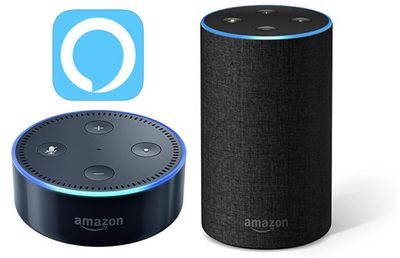From this week, users of Alexa devices in the United Kingdom will be able to get expert health advice from the voice-activated smart speakers, thanks to a partnership between Amazon and the National Health Service.

When health-related queries such as "Alexa, how do I treat a migraine?" or "what are the symptoms of flu?" are put to the devices, Amazon's algorithm will use information from the NHS website to provide answers.
Britain's NHS says the technology will help patients the elderly, blind and those who cannot access the internet through traditional means, to get professional NHS-verified health information in seconds, potentially reducing the pressure on the NHS and GPs, specifically when it comes to providing information for common illnesses.
Currently, Alexa gets its answers to health-related questions from a number of sources, including the Mayo Clinic and WebMD. As a point of contrast, Apple's Siri currently retrieves answers to health-related queries from Wolfram Alpha and Wikipedia.
Secretary of State for Health and Social Care Matt Hancock offered the following comments on the new Amazon-NHS partnership:
We want to empower every patient to take better control of their healthcare and technology like this is a great example of how people can access reliable, world-leading NHS advice from the comfort of their home, reducing the pressure on our hardworking GPs and pharmacists.
Through the NHS Long Term Plan, we want to embrace the advances in technology to build a health and care system that is fit for the future and NHSX will drive this revolution to bring the benefits to every patient, clinician and carer.
In addition, Hancock told Sky News there are "privacy rules" in place to prevent peoples' information being sold on, and that the government was "up for doing this sort of collaboration with other tech companies".
The Royal College of GPs welcomed the move, but warned that independent research will be needed to ensure the advice given out is safe.
Professor Helen Stokes-Lampard, chairwoman of the RCGP, told Sky News:
"This idea is certainly interesting and it has the potential to help some patients work out what kind of care they need before considering whether to seek face-to-face medical help, especially for minor ailments that rarely need a GP appointment, such as coughs and colds that can be safely treated at home.
"However, it is vital that independent research is done to ensure that the advice given is safe, otherwise it could prevent people seeking proper medical help and create even more pressure on our overstretched GP service."
NHS experts believe half of all health-related searches will be made through voice-assisted technology by 2020. The U.K. government has set up a unit called NHSX to boost the use of digital technologies in the health service over the next few years. Measures already being pursued include an expansion of electronic prescribing and the use of artificial intelligence to analyze scans.
























Top Rated Comments
“Ringing in your ears can be caused by a faulty hearing aid. Would you like to buy some Amazon Basics replacement batteries?”